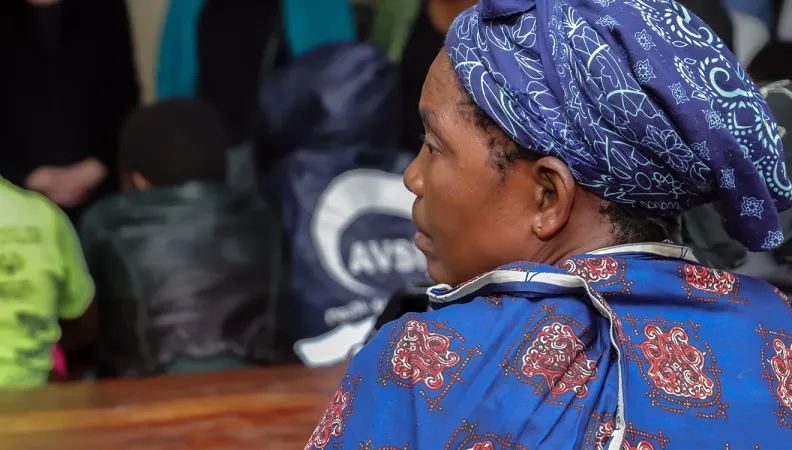Share the page
Pioneering Treatment for Sexual Violence in the Congo - and Applying the lessons Worldwide
Published on

Panzi Hospital in Bukavu, Democratic Republic of the Congo, has been treating victims of sexual violence under the direction of Nobel Peace Prize Winner Dr. Denis Mukwege since 1999. Some 55,000 people – mainly women and children – have sought care at the hospital after falling victim to rape and torture, invariably used as a weapon of war. The hospital has over two decades honed methods to facilitate psychological recovery. Now AFD is backing an initiative to validate the hospital’s medical protocols, so they can be used to treat victims of sexual violence in other parts of the world.
Aged between 2 and 80 years old, they come from across the north of the Congo, a region the size of Croatia. They have been subjected to rape, torture and humiliation. Many of them arrived on foot in Bukavu near the border with Rwanda, after walking for several days, carrying their physical and psychological wounds with them.
Panzi Hospital – the only structure able to treat the women and children –has developed a holistic approach to providing care for bodies and minds, something Dr. Denis Mukwege and his colleagues have been doing for more than 20 years. Women receive two kinds of treatment here, physical care at the hospital and psychological care at the Panzi Foundation a few hundred meters away.
The recovery process is guided by one idea: restore dignity and autonomy to these women and prepare their return to society. AFD Group has been supporting Panzi Hospital since 2021 by financing a project to improve its facilities. In 2022, AFD stepped up its involvement by signing a partnership agreement with psychoanalyst and philosophy professor Cynthia Fleury. She’ll work with Dr. Mukwege to create a Chair in Philosophy at the hospital, which combines research and experimentation drawn from care protocols developed over decades by the pioneering Congolese doctor and gynaecological surgeon.
“I saw that singing and dancing bring joy back to these women, but I can’t explain why,” says Dr. Mukwege. “We’ve never developed a scientific method.” At the Panzi Foundation, women who arrived prostrate and mute eventually open up and re-appropriate their bodies, often through artistic expression. Singing and dancing workshops can be cathartic.
The objective of the Chair in Philosophy is to put a name to the mechanics at work, to establish protocols that could serve elsewhere. “We have the inventors of the resilience of tomorrow here,” says Cynthia Fleury. “These women are no longer simply survivors; they are ‘vectors of knowledge.’”
Prof. Fleury’s objective is to “transform the care protocols and introduce social sciences, philosophy and arts in all the hospital structures.” As a paragon of this mix, Panzi Hospital is located in a region the philosopher defines as a “hub of vulnerability” – an area where a multitude of stress factors (economic, security, health and social) converge and reinforce one another.
The hospital has been developing methods, which, if successful in this extreme setting, will likely be useful in other countries engulfed in violence and lawlessness. The encounter between the field practitioner and the sociologist marks the beginning of a collaboration whose innovative approaches, developed in the humidity of the Kivu region, will be exported for the benefit of science and medicine. It's part of a campaign waged by Dr. Mkwege: the Nobel Peace Prize laureate has called on states to create a global reparations fund to provide compensation to survivors and help them begin new lives.
Care also means looking after the caregivers. The teams at Panzi Hospital work long hours in a hot and humid climate, facing unimaginable horrors. “We work with inhumanity every day,” says Désiré Alumeti, a pediatric surgeon at Panzi Hospital. “I recently took care of a child who had been raped on her mother’s corpse.” He and his co-workers inevitably experience a kind of vicarious suffering. “I’ve already blown a fuse,” he says. Fleury will find ways to support caregivers and help them endure the psychological difficulties inherent in their work.
The teams are pillars of the hospital. Some of them are survivors themselves, who in turn wanted to take care of those who have experienced the horrors with which they are all too familiar. These women don’t count the hours they work and develop close relations with patients in a hospital that could not manage without them. They are a sort of ode to resilience.
The recovery process does not stop when the physical and mental wounds have healed. At the Foundation, women also learn how to gain financial independence at the “City of Joy” via training workshops in sewing and jewellery making. New skills will enable the women to start anew on their return home.
As women rebuild however, old threats remain. Armed gangs plaguing the region treat systematic rape as a rite of initiation, a widespread practice that largely goes unpunished.
This too, is something Dr. Mukwege and his teams are tackling, by dealing with the root causes of such violence by raising awareness and advocacy.
The Panzi Foundation has opened a legal clinic where women can become actors in the prosecution of their torturers. Such is the continuing struggle undertaken by the women, the pioneering Congolese doctor and their allies, in the hope of building a society of their dreams where, as Dr. Mukwege puts it, “mothers are recognized as the heroes they really are.”
Photos: © Jonathan Masasi / French Institute of Bukavu
